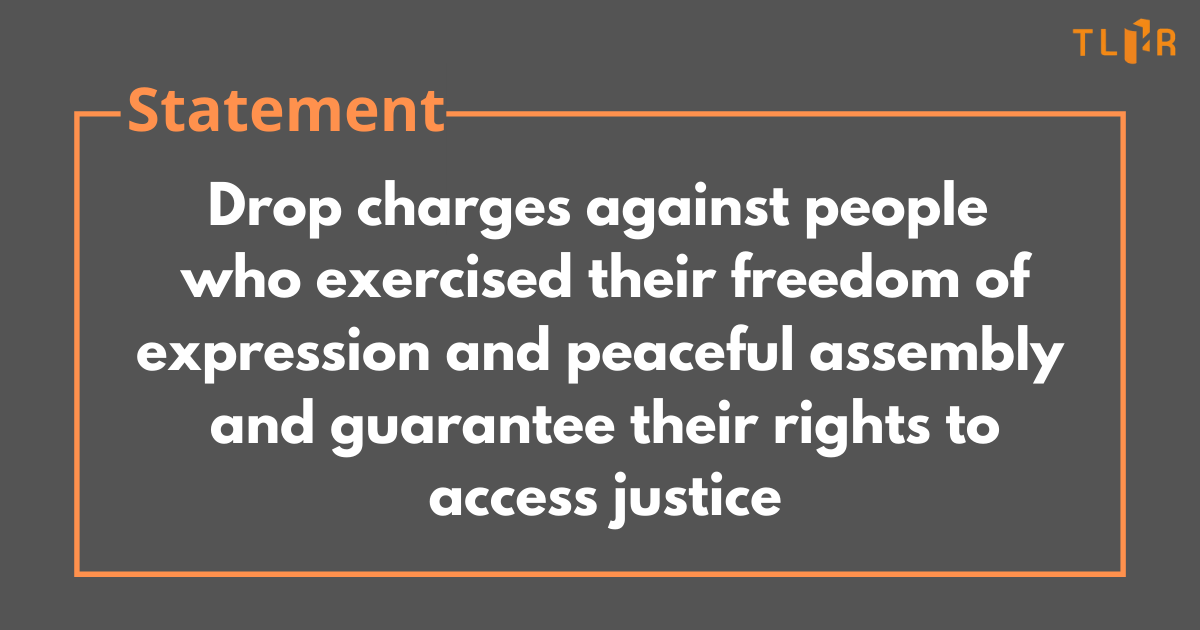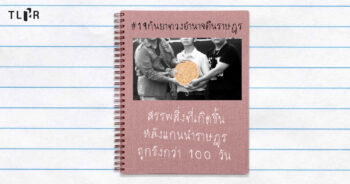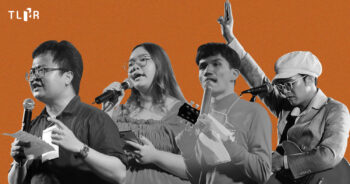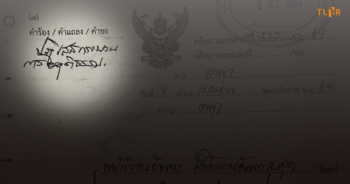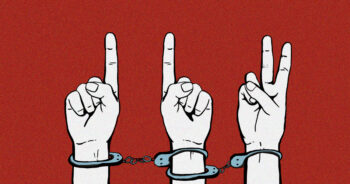During the first outbreak of the COVID-19 pandemic in 2020, protestors continued to stage political rallies demanding the Prime Minister’s resignation, a new constitution, and monarchical reforms in defiance of the nationwide state of emergency. In response, state authorities have pursued legal actions against a number of people who exercised their freedom of assembly. According to Thai Lawyers for Human Rights (TLHR)’s data, at least 358 people have faced charges in 198 cases linked to their participation in political demonstrations and expression of political opinions from 18 July 2020 when the Free Youth Group kicked off their first protest to 14 February 2021. This number also includes at least ten prosecuted youth who are younger than 18 years old.
In these cases, people are subject to numerous severe charges, such as those under the Criminal Code’s Section 110 on violence against the queen from an incident involving Queen Suthida’s royal motorcade, Section 116 on sedition, and Section 112 on royal defamation. Notably, the government has resumed its use of the Lèse-majesté law under Section 112 of the Criminal Code, although General Prayut Chan-o-cha once gave an interview to the media on 15 June 2020 stating that the law’s enforcement had been suspended over the past two to three years because of the King’s mercy. Nevertheless, on 19 November 2020, he issued a Prime Minister’s Statement declaring the government’s intention to use all laws to prosecute the protestors. Therefore, during 24 November 2020 and 14 February 2021, at least 59 people have been charged in 44 cases under Section 112 for offenses linked to their participation in political demonstrations or expression of political opinions. Furthermore, on 19 January 2021, the Criminal Court sentenced Anchan to 43 years and six months in prison for sharing 29 audio clips with criticisms against the monarchy. This conviction marks the harshest sentence ever recorded in the history of enforcing this law.
The number of charges related to rights and liberties during the past seven months has been spiking up at a faster rate compared to the National Council for Peace and Order (NCPO)’s era. This phenomenon signals the trends of increasingly severe human rights violations and weaponization of the law and justice system as a tool for clamping down on the people’s freedom of expression. As an organization that provides legal assistance for those exercising their rights and freedom of political expression since the military coup in 2014, TLHR found that the current issues on access to justice under the current government elected through the mechanisms of the 2017 Constitution are as violent as those during the NCPO regime. Below are some examples of such issues:
- Pressing false charges and issuing warrants for summoning and arresting wrong people
Amid the immediate increase of cases during the recent period, TLHR found that many charges contain false premises and violate freedom of expression and assembly. This principle applies especially to charges under Section 116 of the Criminal Code, which have been filed against those exercising their freedom of peaceful assembly in accordance with Article 21 of the International Covenant on Civil and Political Rights (ICCPR). It is also relevant to charges under Section 112 of the Code — the Lèse-majesté law, which the UN’s human rights body said, should “have no place in a democratic country” Furthermore, some cases clearly do not meet the legal elements required for initiating a criminal procedure, such as the cases against Sombat Thongyoi who posted the sentence “Very brave, very well done, thank you” and a protestor who wore a crop top to Paragon Department Store. In some other cases, the law enforcement issued sloppy arrest warrants. For instance, “Dave” Chayapol, a Thammasat University student, received an arrest warrant under a Lèse–majesté offense linked to an activity in which he did not participate. In another example, “Tong Daodin” also received a summons for allegedly participating in a protest on 19 September 2020 even though he did not join the activity on that date. This law enforcement approach significantly creates an unnecessary burden for the people who need to enter lawsuits and exploits the justice system by turning it into a political weapon.
- Detaining persons outside the inquiry official’s office
According to the Criminal Procedure Code, after making an arrest, the authorities must immediately take the arrestee to the inquiry official’s office, which holds the jurisdiction over the area where the arrest took place. However, from 13 October 2020 to 13 February 2021, TLHR found that at least 111 people participating in political protests in Bangkok were arrested and subsequently taken to the Border Patrol Police Region 1 headquarters in Pathumthani Province for detention. This practice does not only violate the Criminal Procedure Code but also deprives the defendants of their rights guaranteed under the law. Ordinary citizens also could not investigate or easily access to the detention, thus posing high risks of exposing the detainees to other human rights violations, such as torture or enforced disappearance.
Furthermore, moving the detention to the Border Patrol Police Region 1 headquarters, which is more than 50 kilometers away from inner Bangkok, creates a delay for lawyers and relatives in accessing the suspects. Upon arrival, the lawyers and relatives must park outside the building and get in a car provided by the authorities to go to the detention center, which is more than one kilometer further from the headquarters itself. They also needed permission from the Border Patrol Police Region 1 headquarters before entering the venue. For example, in the case linked to the demonstration on 13 February 2021, the lawyers waited for permission for approximately one hour. In the case linked to the demonstration on 13 October 2020, the lawyers waited for permission for five hours. This issue continues to occur even if Section 7/1 of the Criminal Procedure Code grants the right to access lawyers for “arrestees” immediately after the arrest.
- Limiting the rights of access to lawyers
TLHR found that inquiry officials’ offices in many locations have installed a camera for recording the acknowledgment of charges. Police officers also take photos of the process without asking for the permission of suspects or lawyers. It also remains unknown who could access such photographs and videos and to what extent they are involved in the cases.
Meanwhile, the authorities strictly control the use of mobile phones for the suspects and their lawyers, especially during the process of acknowledging charges at the Border Patrol Police Region 1 headquarters. The police officers will not allow the lawyers to enter a meeting room if they do not leave their phones with the officers. Sometimes, they would also tell the lawyers that they would not be allowed to enter the Border Patrol Police Region 1 headquarters if they do not cooperate. On the other hand, the officers could freely use their mobile phones to record the process despite the absence of regulation or law authorizing them to do so.
- Withholding information about the fate of detainees
Sirichai Natueng, a Thammasat University student charged under Section 112 of the Criminal Code, had been detained since 8:50 pm. However, the authorities did not allow him to contact his lawyer and confiscated his mobile phone. Later, at 11 pm, he was permitted to briefly contact his lawyer before getting his communication channels cut off. Police officers from the Klong Luang station informed his friends that they transferred him to the Border Patrol Police Region 1 headquarters. However, when his friends went to check at the given venue, they did not find him. Later, the lawyer found Sirichai at his dormitory at around 01:30 am. During the period of his arrest, the authorities did not allow him to access his lawyer or relatives and withheld information about the place of detention for almost five hours. Accordingly, it could be interpreted that Sirichai was placed outside the protection of the law, thus rendering this incident as enforced disappearance under the definition provided by the International Convention for the Protection of All Persons from Enforced Disappearance (CED).
- Refusing to grant a temporary release
TLHR found that, in October 2020, the Court did not allow for the temporary release of many people among 358 suspects in 198 cases who were held in official custody during the inquiry stage. However, currently, the suspects have been released temporarily, or the Court no longer allows for any more extended detention. Most cases are presently undergoing the inquiry stage or the public prosecutor’s review. However, on 9 February 2021, the public prosecutor indicted protest leaders for offenses linked to the 19 September protest and “Mob Fest” rally. The Criminal Court refused to grant bail for the defendants, citing the charges’ heavy penalties and the defendants’ tendency to re-commit the offenses on numerous counts. The Court claimed that the defendants might commit the acts similar to the allegations should they be released temporarily. Due to this court decision, Parit Chiwarak, Arnon Nampa, Somyot Prueksakasemsuk, and Patiwat Saraiyaem must remain in jail while awaiting trial. They could only be released upon the Court’s approval or dismissal of the case. There is no definite time frame determining how long the four of them would remain in detention.
This scenario could also occur to three other protest leaders – Panupong Jadnok, Panusaya Sithijirawattanakul, and Jatupat Boonyapataraksa – who might face indictment by the public prosecutor in the same case. The indictment decision would be delivered on 17 February. Moreover, hundreds of protest leaders and protestors may also face similar predicaments when fighting their lawsuits in the future.
TLHR views that the detention of any person while awaiting trial violates the principle on the presumption of innocence, which shall apply to all suspects and defendants until the Court reaches its final verdict. This principle is at the heart of criminal law, aiming to protect the rights of suspects and defendants in the criminal procedure. It has also been guaranteed under Section 29 of the 2017 Constitution and Article 14(2) of the ICCPR. As the detention impairs the defendant’s ability to fight their case at full capacity, holding them in custody while awaiting trial would mean that the Court already assumes that they are guilty.
TLHR believes that the justice system should serve as the main pillar for upholding the society amid the ongoing political conflict and differences of opinion. Should the justice system collapse and become a political tool, the public would lose trust in the system, and the society would be doomed. Accordingly, TLHR demands relevant organizations to take the following actions:
- The Police shall drop false and unfair charges and ensure legal compliance by holding any persons in custody at the inquiry official’s office rather than the Border Patrol Police Region 1 headquarters. The authorities shall also respect the rights to counsel of arrestees and suspects.
- The Public Prosecutor shall consider ordering not to indict or revoking the indictment in any cases against people who exercised their freedom of expression or peaceful assembly, cases that do not benefit the public, and cases that do not clearly meet necessary legal elements.
- The Court shall consider allowing a temporary release of the defendants upon the presumption of their innocence, one of the fundamental principles under criminal law.
With respect for the people’s rights and liberties
Thai Lawyers for Human Rights
15 February 2021
